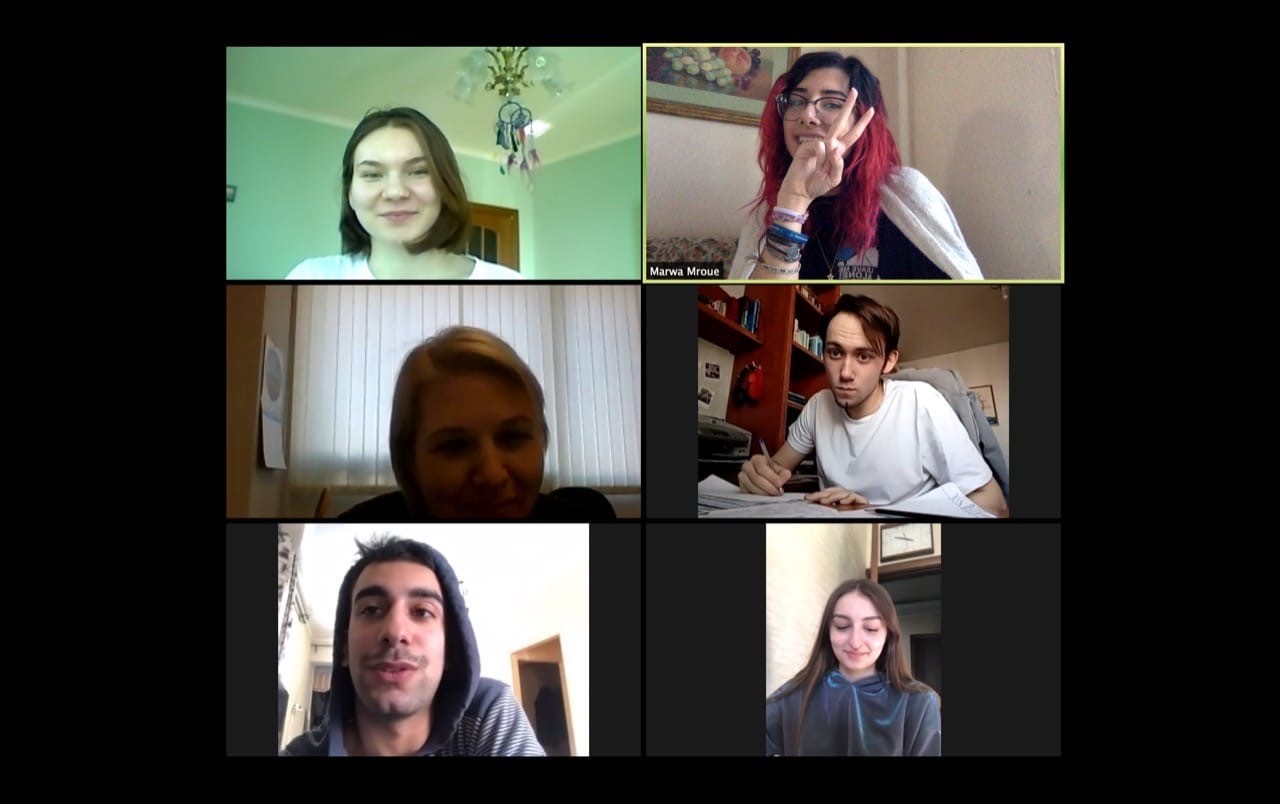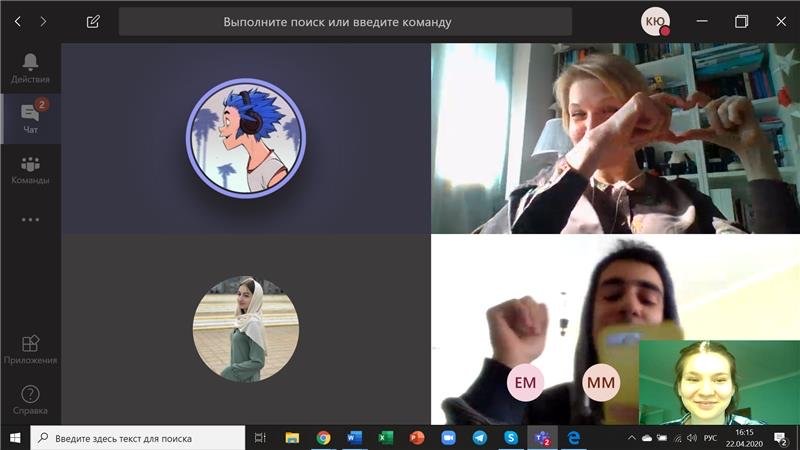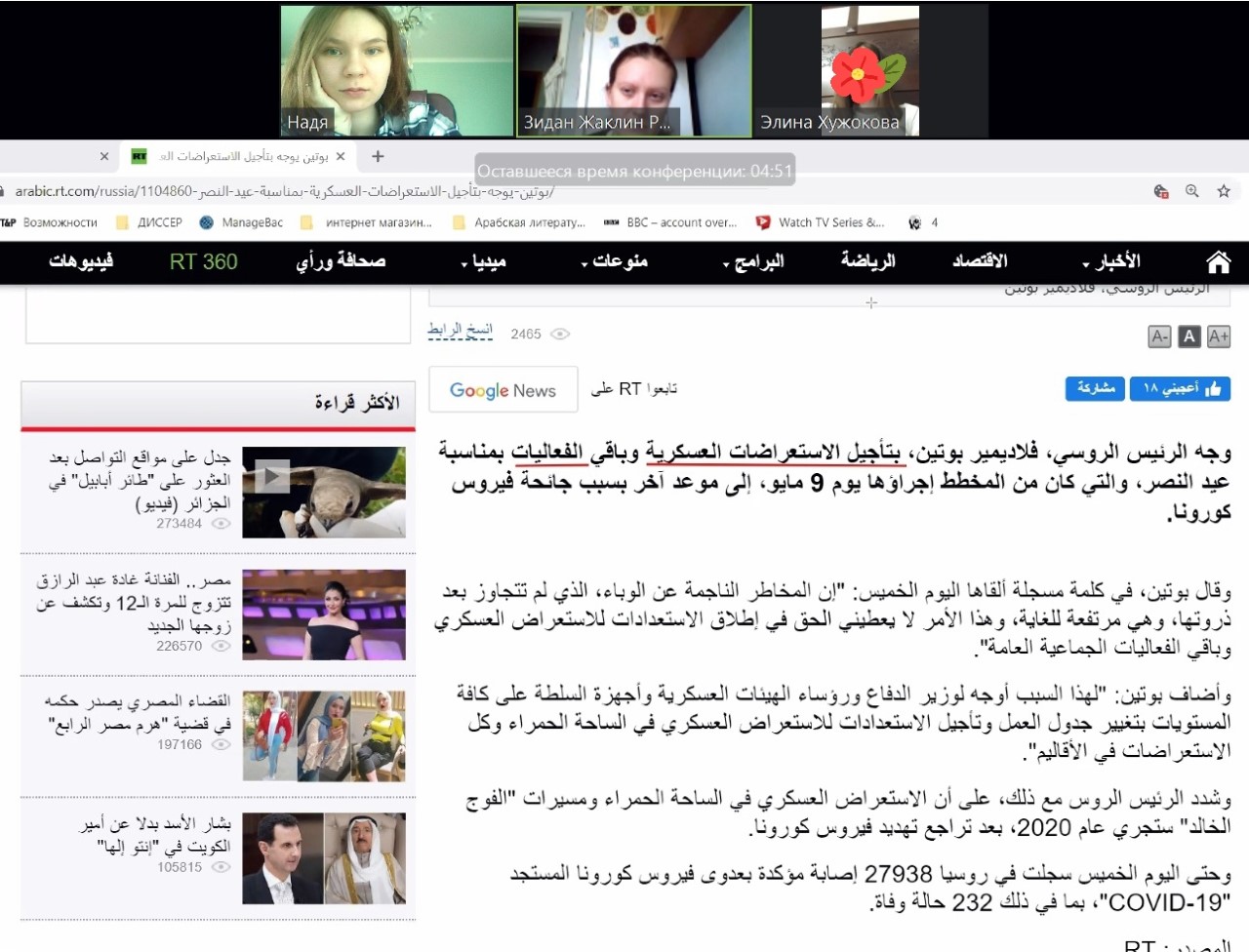“My dog attends all classes. It seems to me that she has already learned the conjugation of Arabic verbs, ”- Natalya Dubinina, Ph.D., assistant professor of the Department of Foreign Languages, Faculty of Philology, Deputy Dean for Academic Affairs
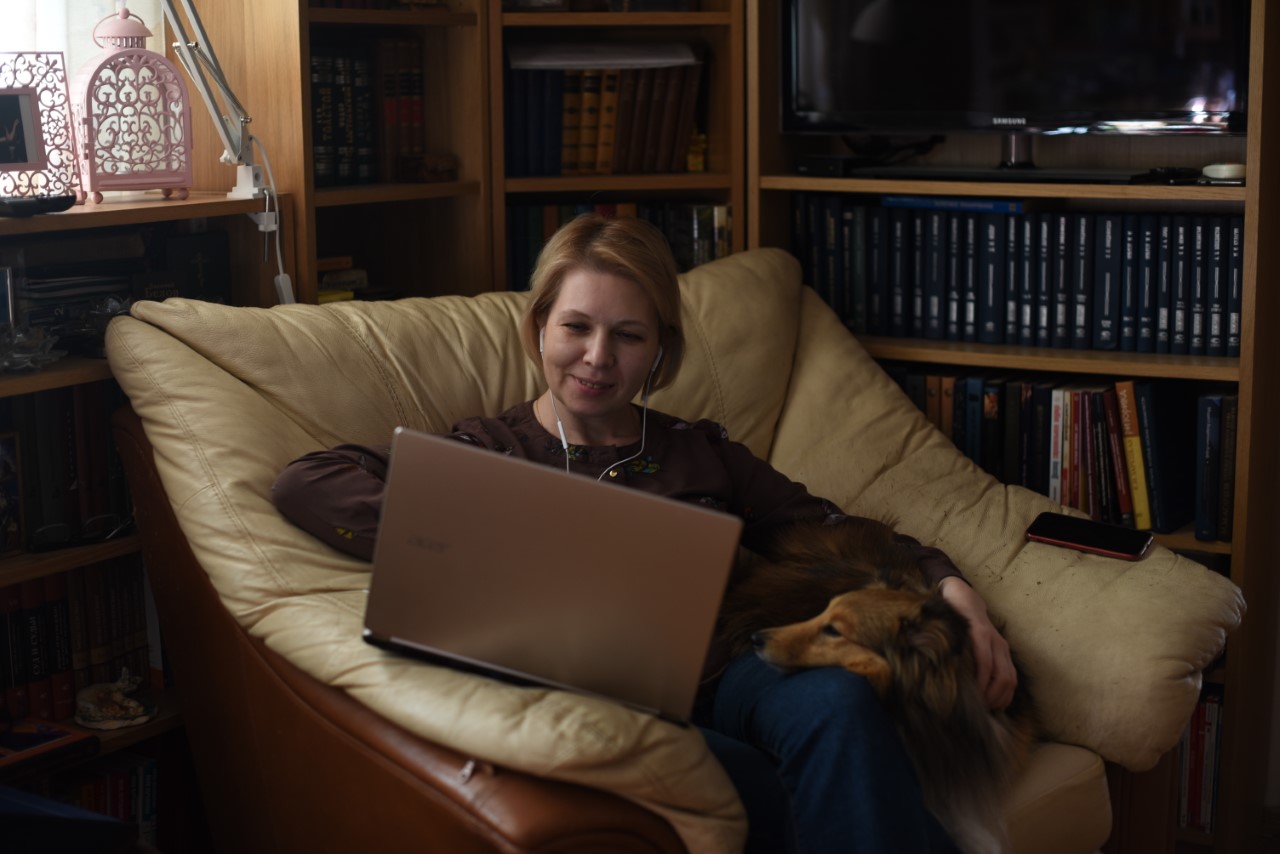 Natalya Valentinovna, how to teach a foreign language at online seminars?
Natalya Valentinovna, how to teach a foreign language at online seminars?
It is difficult to teach from scratch, but it is possible to check already formed competences and develop new skills. Students demonstrate speaking skills in an online lesson in exactly the same way as they did in the classroom: we discuss topics, read texts and act out everyday situations. Game techniques remain in distance learning: we explain and guess words in Arabic, compose stories and portray characters. We practice articulation using video simulators - we have identified the best available. Writing skills are harder to train, but also possible. Now students take pictures or scan their notebooks and send them to me. Preparation and correction of tasks in this format, of course, takes more time than usual. I can only be happy that forced transition to the remote format did not occur at the beginning of the school year, when we were just beginning to master the Arabic script.
And what was the most difficult thing when switching online?
The most difficult thing was to write in Arabic on a virtual whiteboard with the mouse or on the touchpad. After several unsuccessful attempts, I learnt to use the usual Word file as a “board” in the screen sharing mode. I like mastering new forms, coming up with something original, interactive, so that students are not bored. At some point, I realized that I was overdoing it with different types of tasks. I had to make myself stop and to plan the workload in order to distribute the deadlines.
How hard was the preparation of assignments for intermediate testing?
I prepared for the first distance testing in advance - I studied the abilities of different platforms. I spent the whole “vacation” week trying to figure it out. Most of all I liked working in MS Teams - there I can post tasks, check them, grade and publish the results. As a result, I created grammar and vocabulary tests and made texts for translations from Russian into Arabic, and from Arabic into Russian. I realized that closed tests do not suit me - like "choose the right answer from the four possible." I teach a foreign language, so I prefer tasks with the possibility of open answers, which I then review and evaluate manually. For theoretical disciplines - for example, for the "Methodology of Teaching the Arabic Language" - I picked up scientific articles that students read at home and then actively discussed in an online lesson. And as a final assignment for the semester, students prepare short video lessons for the elementary level of the Arabic language.
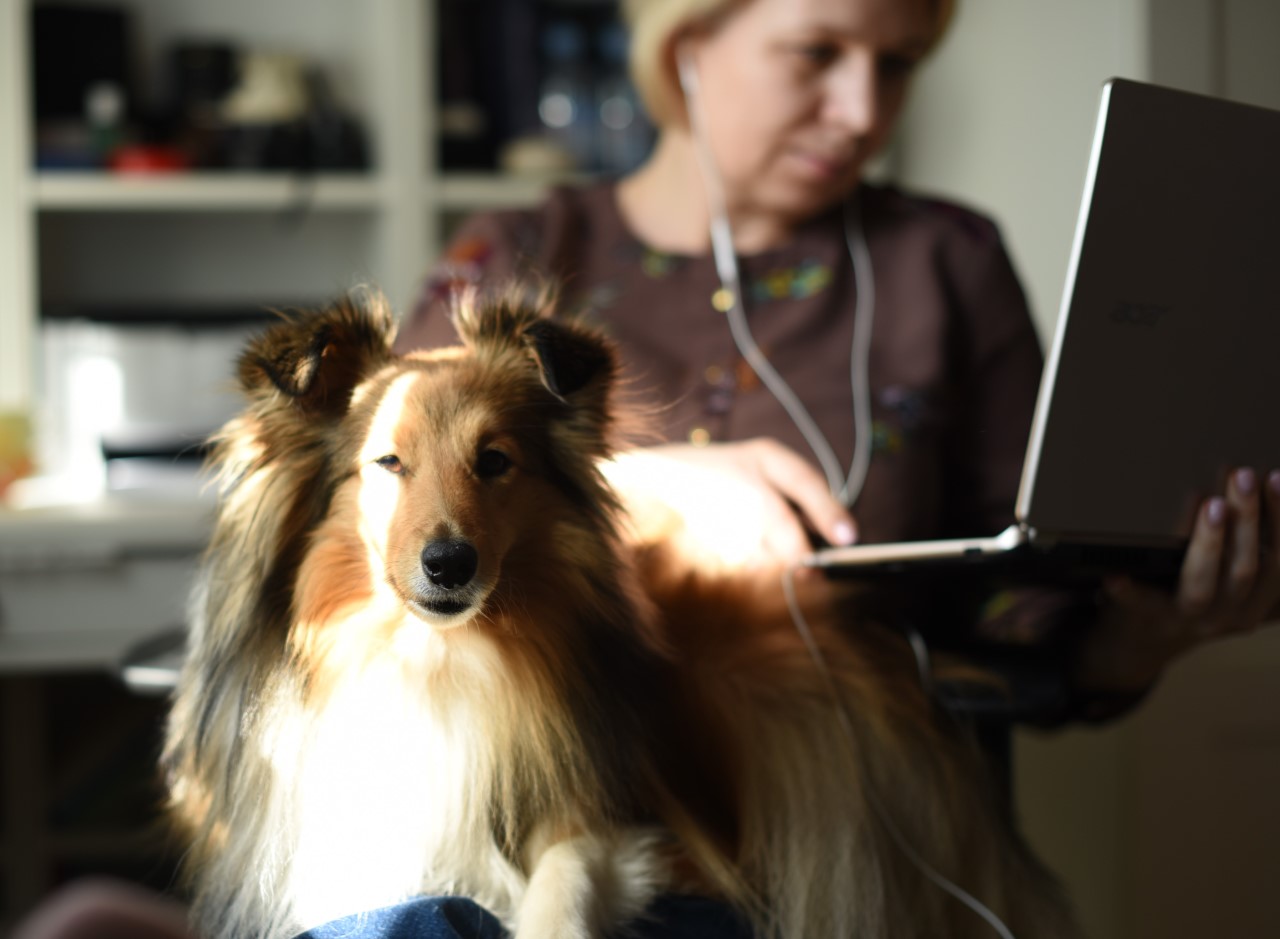 What helps you concentrate when working from home?
What helps you concentrate when working from home?
Planning and a clear schedule. In my family, now everyone works from home - everyone has a full-time job and their own household chores. Business dress code helps me switch to another mode. I also have my favorite places for conducting online classes: a comfortable armchair in the living room and a desk. But wherever I am, my Sheltie dog is always sitting next to me and participating in absolutely all classes and meetings. According to her passport, she is Diva La Vita Valerina Ros, but by her nature she is a red-headed hooligan, so from the first days she received the name Becky. It seems to me that she has already learned the conjugation of Arabic verbs and knows for sure how the grammar-translation method of teaching a foreign language differs from the direct and communicative one.
Can university education be fully online?
A completely remote format is unacceptable to me. I am convinced that training will never be complete without personal contact, exchange of energy and emotions. It is important for me to catch the mood of students, and see their faces. This is the only way I understand that they are tired and they don’t hear me anymore. Or vice versa – they are energetic and can easily learn something complicated. On March 27, right on the eve of the mandatory transfer to a distance format, I recorded several 20-minute lectures that I delivered in a completely empty classroom of Petra — this is my favorite classroom of Arab culture at the Philological faculty. I wrote on the blackboard explaining the topic. And all the time, out of habit, I turned around in the hope of seeing faces but seeing only the camera. I must admit it was pretty sad.
What do you especially miss at the university?
I miss live communication with colleagues and students. Colleagues and students are not only avatars or “talking heads”. I miss the energy of the RUDN University as a whole, because this is the place where I’ve spent most of my life.
“Arabic classes are interesting both at the university and online. Classes have actually become more diverse: we have new types of work and new platforms for completing tasks. Often in Arabic classes we use a “screen shot”: the teacher can explain the new topic to the group and show the materials and tables individually. This method is much more convenient than whiteboards in the classroom. The new presentation of the material seems interesting and convenient - it makes it possible to follow the teacher’s thought without distracting.
Nothing is impossible, therefore, it is possible to learn a foreign language remotely, but live communication with a native speaker or teacher provides deeper knowledge that is learned more efficiently and better than online. At the weekend, we watch films and TV shows in Arabic, after which we share our impressions. Every day we try to find new ways of learning and interesting innovations that, I am sure, will remain with us in the future”, Nadezhda Kalitina, Linguistics, 2nd year
“Natalya Valentinovna’s diligence and love do not allow to feel the difference between traditional and remote classes. On the contrary, we have a lot of interactive experience, each of us performs tasks that are not like typical memorization of rules: we work with texts and play mini-games. Such methods effectively replenish vocabulary”, Hussein Al-Sahab, Linguistics, 2nd year
“In RUDN, everything went well pretty quickly. For me personally, this training format was a real discovery. Initially, I thought that there would be a huge number of problems with communication and with the perception of information. However, literally one lesson later I got into a rut and even found some advantages in it: it turns out there are many services that provide good connection quality, and also a variety of tools for conducting classes. For example, Zoom has a virtual whiteboard, which can be used by any participant in the conference, and the ability to demonstrate the teacher’s screen seems very useful to me.
I can confidently say that I do not feel any discomfort from remote classes. “It has always seemed to me that, in general, the main thing in training is the desire to attend classes”, Ilya Demichev, Linguistics, 2nd year
RUDN University staff and alumni received state and departmental awards at the State Kremlin Palace during a festive concert in honor of RUDN 65th anniversary.
An architectural-landscape project by a 5th-year student of RUDN has been shortlisted for the annual International Professional ADD AWARDS 2024 for architects, designers, and developers in the “Urban Environment” category.
RUDN University employees’ work and contribution to the development of the university cannot go unappreciated. The Ministry of Science and Higher Education of Russia recognizes talented university employees and present them with various departmental and state awards.
